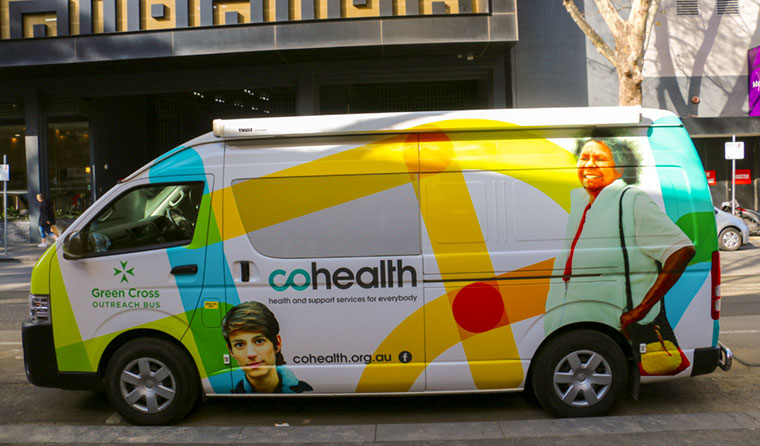News
Breaking down healthcare barriers for vulnerable populations
Specialist services are helping to address accessibility issues for the community’s most vulnerable.
 Dr Kate Coles (far right) finds it rewarding to be able to provide medical care for vulnerable people who may have barriers to accessing healthcare.
Dr Kate Coles (far right) finds it rewarding to be able to provide medical care for vulnerable people who may have barriers to accessing healthcare.
The Australian Institute of Health and Welfare (AIHW) determines vulnerable or ‘priority’ populations as people who:
- experience homelessness
- are Aboriginal and/or Torres Strait Islander
- are from culturally and linguistically diverse backgrounds
- are in contact with criminal justice systems
- identify as LGBTIQ
- experience mental health conditions
- inject drugs
- are older or younger.
People from these groups may experience poorer health outcomes, and alcohol and other drug use is more common in some, new
data has revealed.
Alcohol and other drug use among people in the
criminal justice system is higher than in those in the general population, with 65% of prison entrants in 2018
reporting illicit drug use in the year prior, while 75% retuned a positive urine sample for at least one drug type in 2017.
For people who inject drugs, 73%
reported an injection-related health problem in the month prior in 2018. Unsafe injecting practices were responsible for 0.5% of the total burden of disease and injury in 2015.
The AIHW determines that there is a strong link between alcohol and other drug use and people experiencing homelessness, with 56% of those accessing specialist homeless services in 2017–18
reporting problematic use of alcohol and other drugs.
The 2016
Illicit drug reporting system national report showed that 80% of injecting drug users had a history of homelessness, and 25% were currently homeless.
To accommodate an
increasing number of Australians accessing specialist homeless services, more of these services have become available across the country, providing centrally based free healthcare to the most vulnerable people in the community.
Western Australia’s
Freo Street Doctor is a mobile health service staffed by GPs, nurses and social workers; Adelaide’s
Hutt St Centre provides meals, showers, legal aid and social services to people experiencing homelessness; and
the Living Room in Melbourne is a safe space providing primary health services and recreational activities.
 A Melbourne-based mobile medical clinic is one of a number of growing services offering free healthcare to vulnerable populations nationwide.
cohealth
A Melbourne-based mobile medical clinic is one of a number of growing services offering free healthcare to vulnerable populations nationwide.
cohealth is a Melbourne-based outreach medical clinic operating out of a mini bus, with Dr Kate Coles as the GP. In Dr Coles’ experience, people who are sleeping rough are often using alcohol and other drugs, although she believes more research is needed on the comparisons with the general population.
‘It is a bit difficult to gauge the prevalence of alcohol and other drug issues in our homeless populations versus the average Australian population, and we are collecting data to determine this, but my feeling is that there is a higher prevalence of alcohol and other drug dependence [in homeless populations],’ she told
newsGP.
A typical day for Dr Coles and her team will see common general practice presentations such as cold and flu-like symptoms, immunisations, sexual health and general health checks.
What could be considered more common presentations in people who are experiencing homelessness, however, may include skin infections from wounds or bed bugs, fungal skin and foot infections, and drug and alcohol dependence.
Dr Coles also treats patients with chronic disease such as hypertension, diabetes and hepatitis C. Mental health issues are also common.
‘Depression and anxiety, bipolar affective disorder and schizophrenia ... and a lot of undiagnosed mental health issues which we are collecting data around,’ she said.
In some ways the mobile clinic operates like ‘a normal general practice service’, Dr Coles said, but with limited space and equipment.
‘We are not able to do everything that we could do in a normal clinic, but I can book people in with me at the
Central City [cohealth] site, or patients can see doctors or nurses at any other cohealth site,’ Dr Coles said.
‘[And] just like a normal general practice service, I can refer patients to hospital outpatient departments and emergency, or to a private specialist.
‘But, as you can imagine, the people I see on the bus rarely have private health insurance and cannot afford to see specialists privately.’
Despite acknowledging her work as a mobile GP ‘frustrating at times due to the systems that have lead to the person being homeless’, Dr Coles finds it rewarding.
‘To be able to provide medical care for people who have not been engaging with health services is rewarding,’ she said.
‘One of the most rewarding aspects is working so closely with a team. There is a social worker and a nurse on the bus, and we have a great team at Central City that patients can be referred to see as well.’
alcohol and other drugs homelessness mental health vulnerable populations
newsGP weekly poll
Health practitioners found guilty of sexual misconduct will soon have the finding permanently recorded on their public register record. Do you support this change?